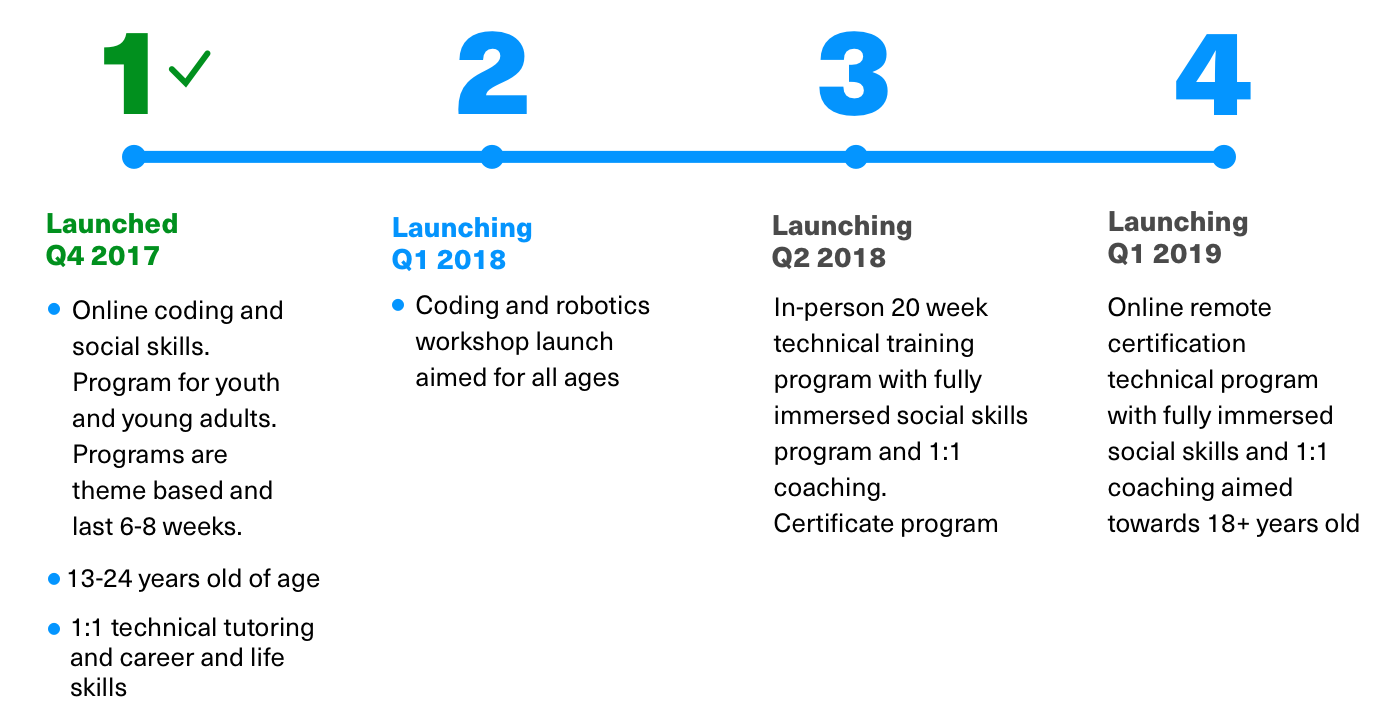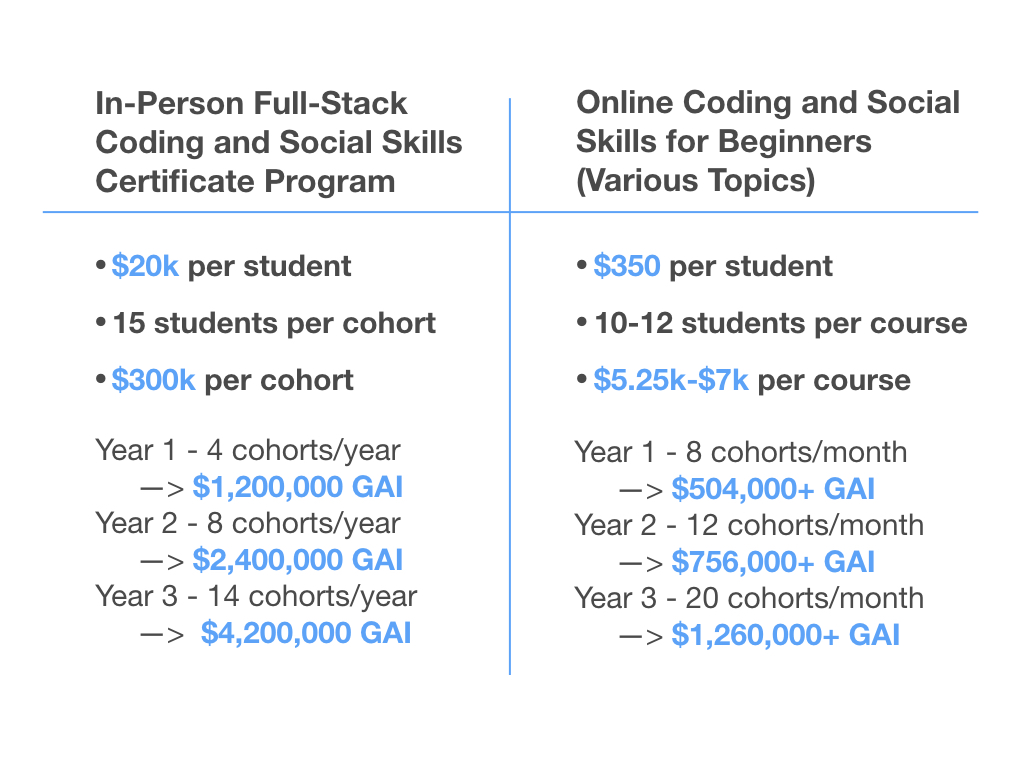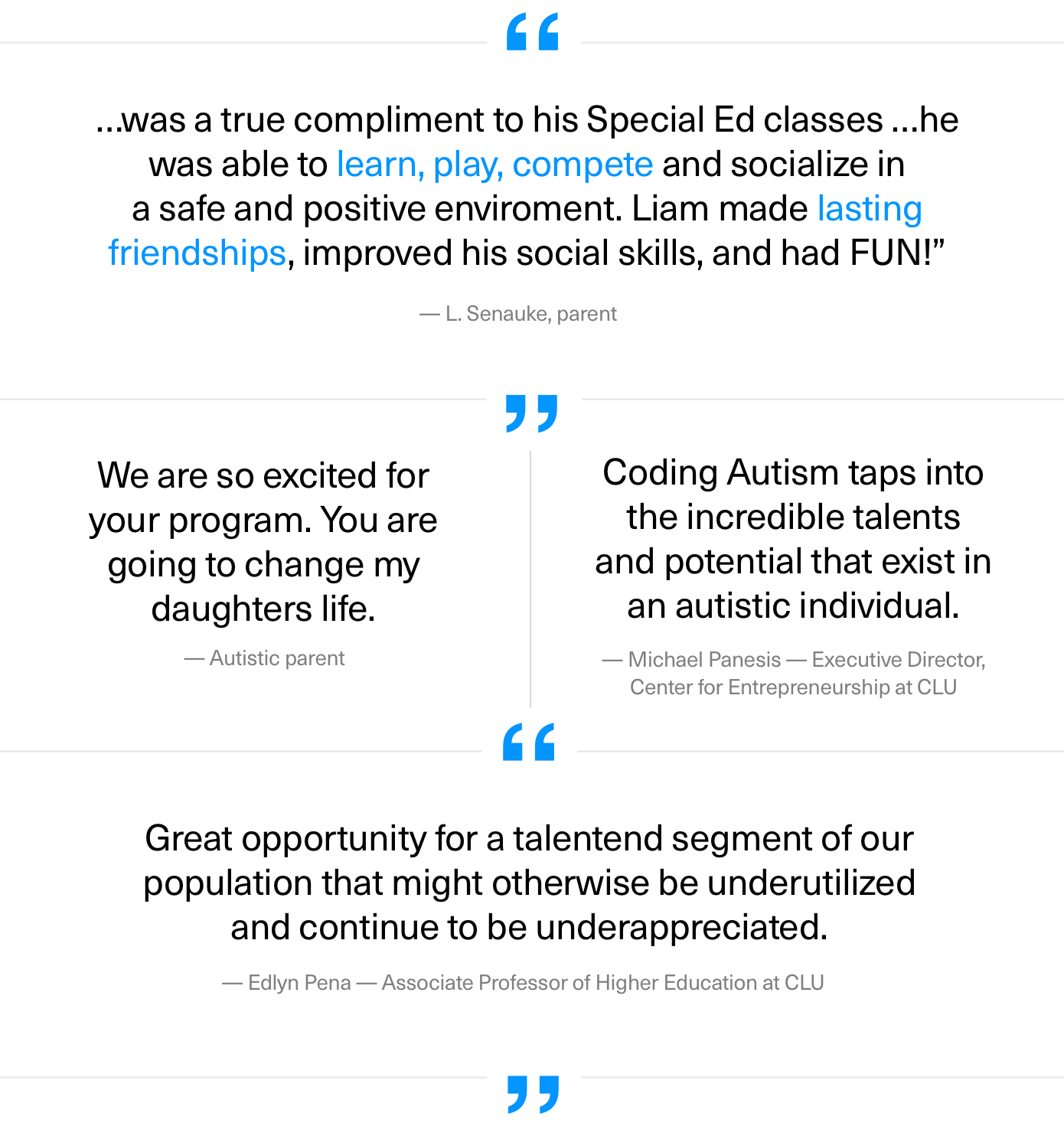People on the autism spectrum are getting the support and skills they need to break into the tech industry. And it's all ...
 Oops! We couldn’t find any results...
Oops! We couldn’t find any results...
 Oops! We couldn’t find any results...
Oops! We couldn’t find any results...
Coding Autism isn't accepting new investments
Explore new investment opportunities:
View companies raising now
Coding Autism
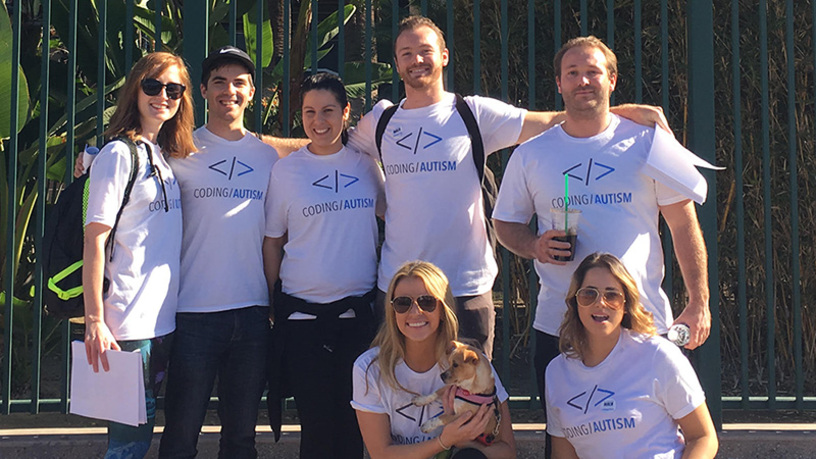
been refunded.
Open for investment
Documents
 Form C
SEC.gov
Form C
SEC.gov
Deal Highlights
Autistic characteristics perfect for technology jobs, yet 1M unfilled tech positions are expected by 2020
Coding Autism is widening the STEM funnel with autistic talent and empowering autistic adults to get employment through professional and social skills training
Microsoft, HP, SAP, Google, EY and more top firms have or will have autistic talent hiring divisions
Featured in Mashable, Yahoo Tech, Autism Speaks, The Mighty and others
150+ applicants on the waitlist for 15 slot in-person vocational certificate pilot program

Autism is not what you think it is
Autism is a neurological variation that occurs in about 1% of the population that refers to a range of conditions characterized by challenges with social and communication skills. While all Autistics are as unique as any other human beings, they share common characteristics, including:
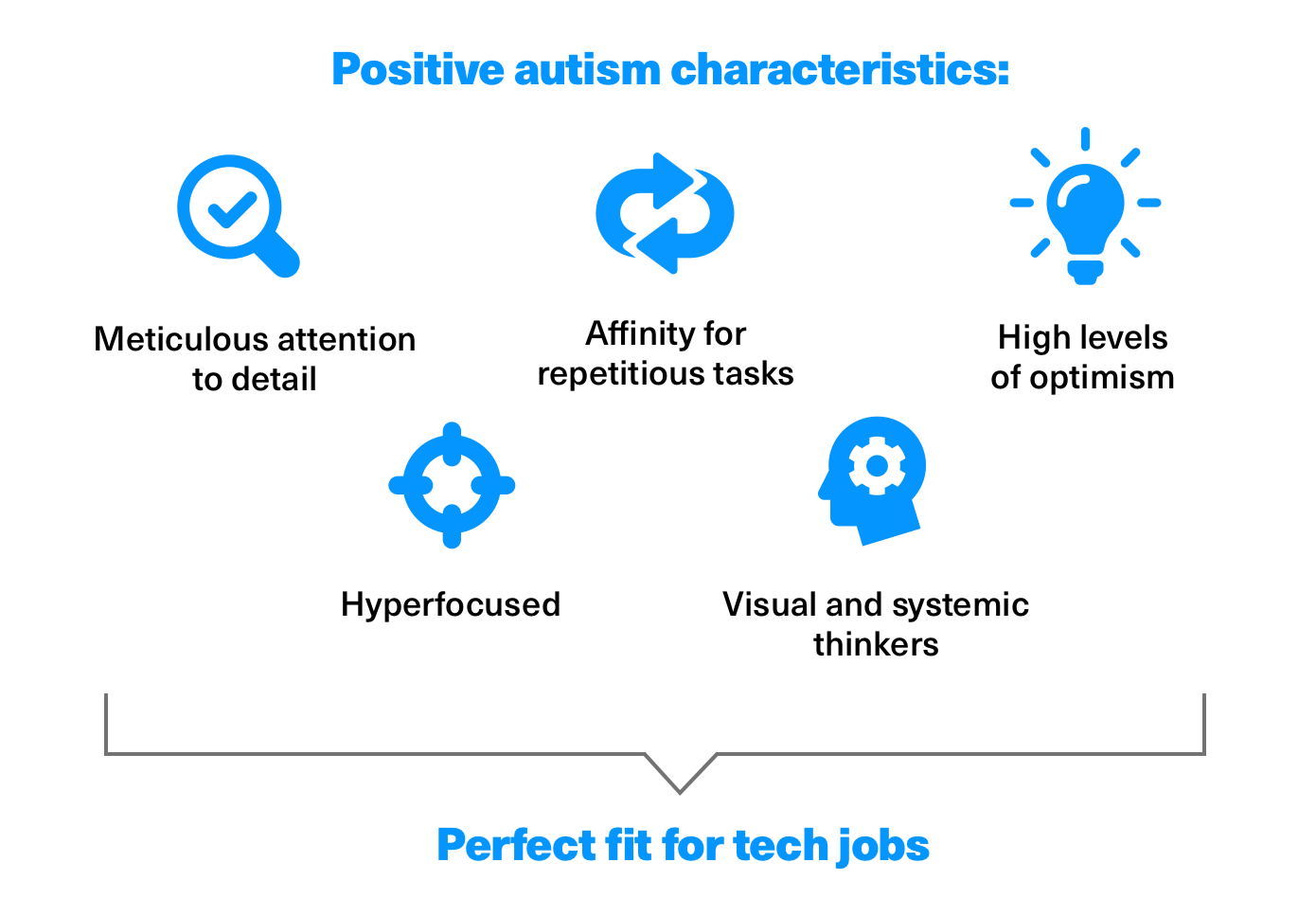
Research has shown that typical autistic characteristics such as attention to detail, affinity for repetitive tasks, and introversion are all traits that lend themselves to becoming a successful employee within the tech industry.

Value of autistic talent recognized by companies:

Problem: This isn’t recognized by everyone yet. Autistics have hard time finding jobs.

Solution:
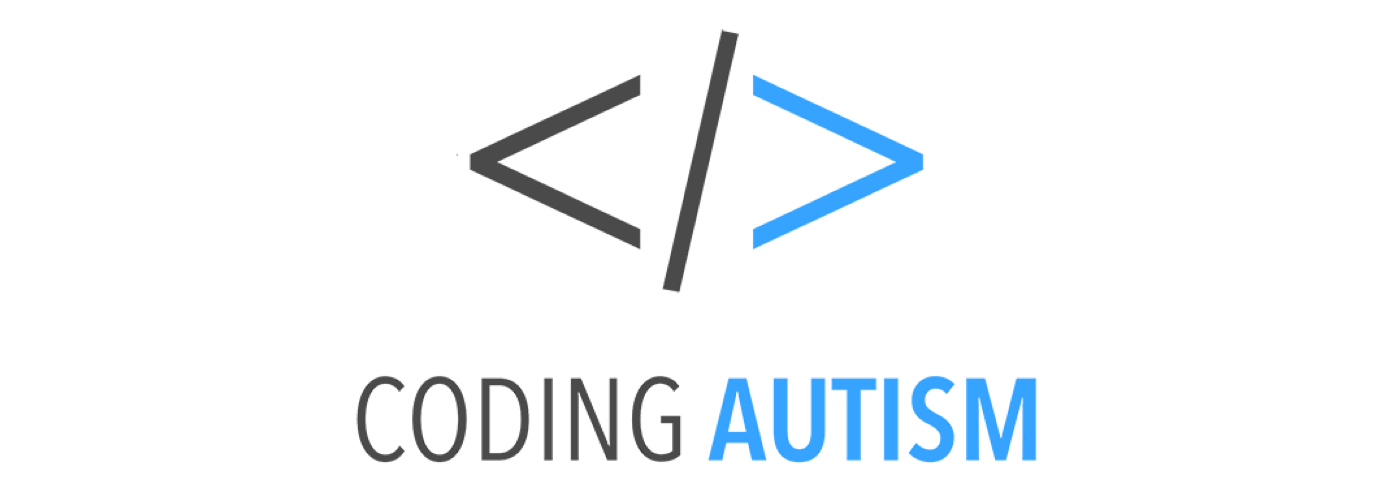
Navigating autistics into meaningful STEM careers.
Coding Autism inspires the next generation of neurodiverse STEM leaders by:
helping identify, develop, and support STEM learning at a young age
keeping students engaged through high school and into vocational programs or universities.
For neurodiverse adults:
We are providing integrated technical and social skills training that reduce the overall un/underemployment rate by finding them meaningful STEM employment.
For organizations:
We assist organizations who are looking for untapped talent to fill their computer science roles.
Our programs
Coding Autism provides a suite of services for autistic teens and adults, all centered around building vocational skills, social/communication skills, and overall independence.
I. Adult In-Person Coding and Social Skills Certificate Program
A premiere coding bootcamp for autistic adults.


This is a 20 week, full-time course where students will be learning the fundamental skills necessary to secure an entry-level web developer job. We cover both front-end and back-end skills, and fully integrate them with social and career skills training. By the end of the course, students will walk away with a portfolio of full-stack web applications which they can use when applying to their first developer jobs.
II. Online Coding and Social Skills for Beginners
Our online coding and social skills programs allow students to learn the fundamentals of coding from anywhere in the world.

Presentation and communication skills sold in packages of eight one-hour sessions, these programs open up the STEM funnel for kids, teens, and young adults. With a strong fundamental base, students will be encouraged to pursue STEM-related studies and professions. The themes of these programs vary throughout the year.
III. STEM Robotics Workshop
To help widen the STEM funnel, Coding Autism has recognized that we must identify, develop, and support autistic STEM talent starting at a much younger age.
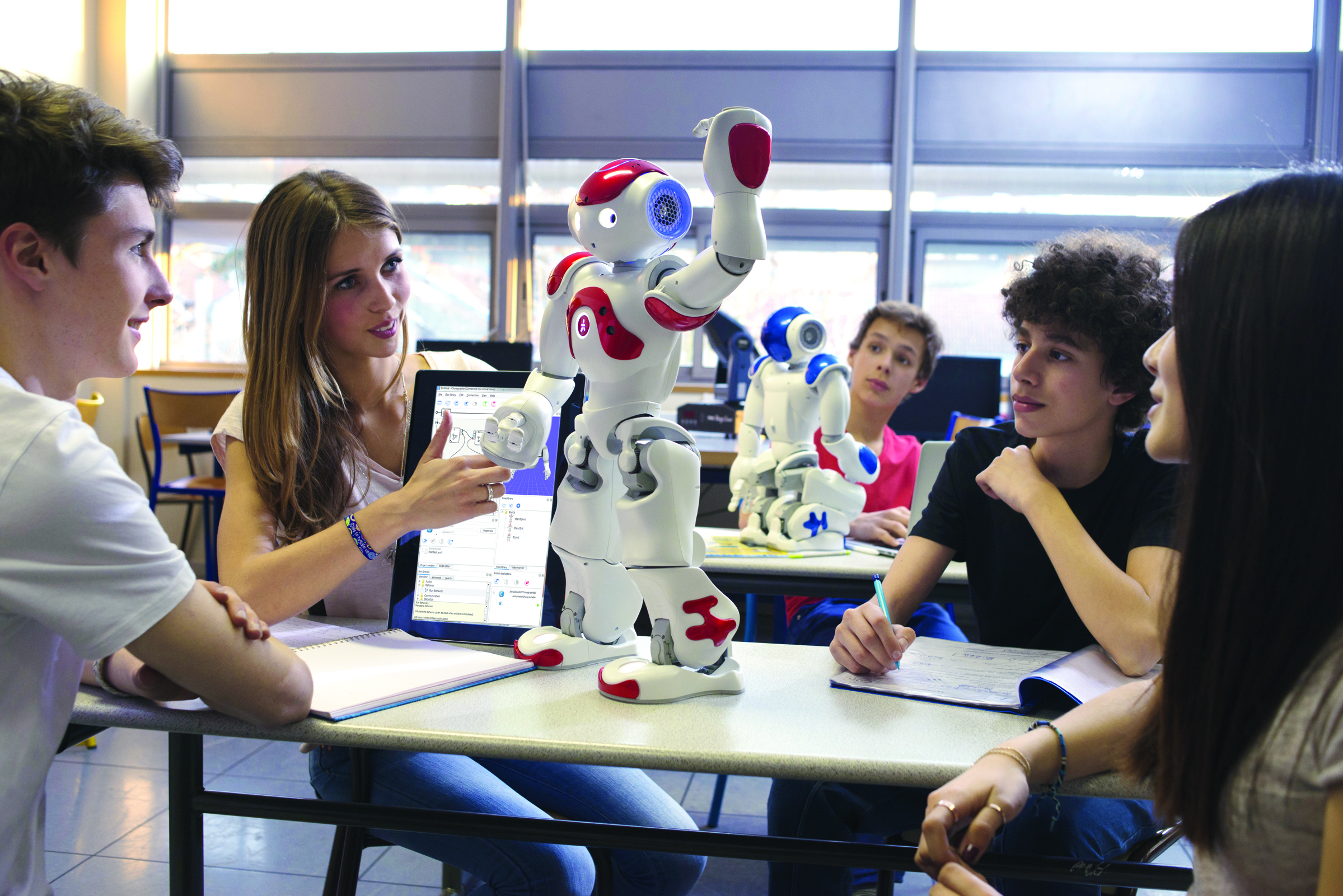
We are identifying and recruiting autistic talent starting in middle school and engaging that talent through our coding program and soon through our STEM Robotics Program. The more we can teach kids how to apply science, technology, engineering, and mathematics to the real world, the more successful they will be in the future; innovation and creativity become a foundation. Our goal is to acquire NAO robots which have been clinically used at universities across the US with autistic students successfully. NAO successfully bridges the communication for autistic kids and engagement levels have increased immensely. Students will have the ability to code and interact with NAO.
IV. Social Skills and Career Coaching Services
Coding Autism provides individualized 1:1 career and social skills coaching for autistics of all ages.
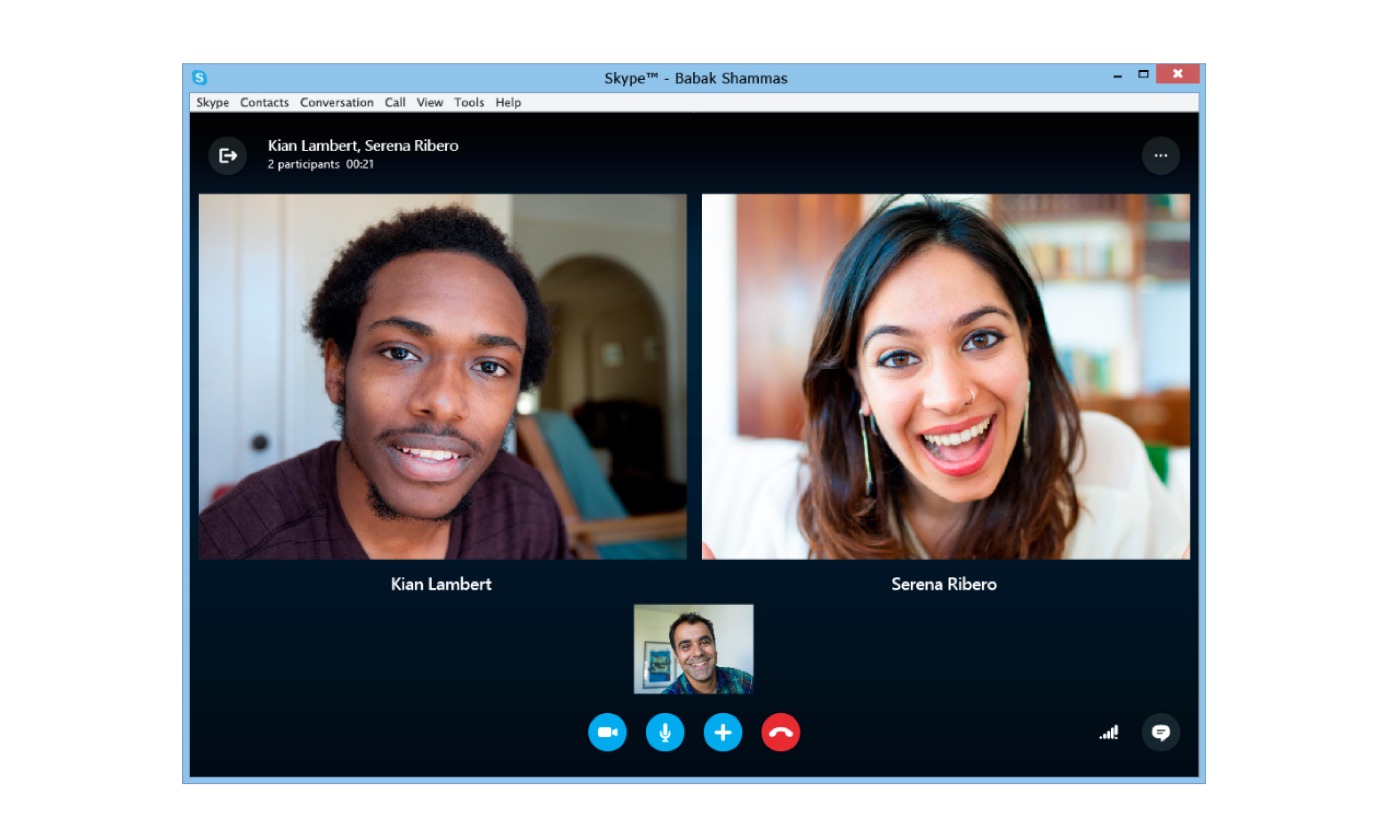
Because these services are individualized, rates and structure vary based on the needs of the individual. We also provide tutoring and individual learning services in coding and STEM.
Our Roadmap
Market Expansion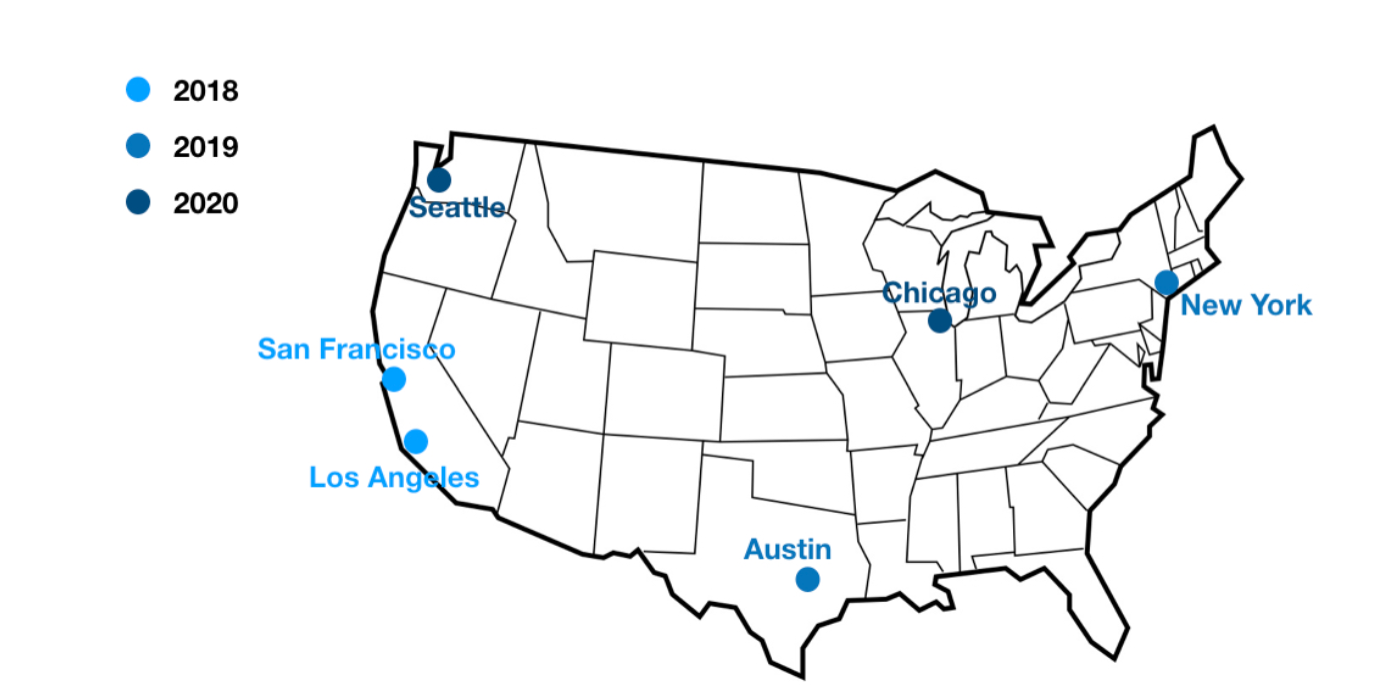
Notable Traction

Projected Revenue Streams
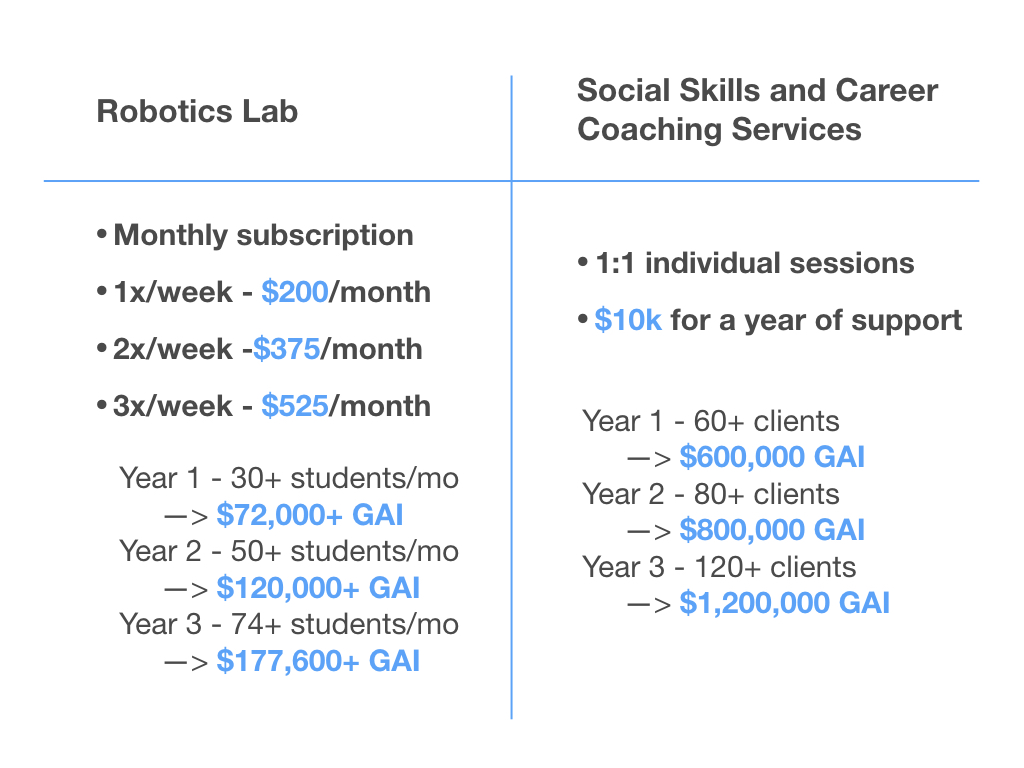
What our community says:
“Geek syndrome”: Why Autistics is an amazing source for talent for tech.
Research has shown that typical autistic characteristics such as attention to detail, affinity for repetitive tasks, and introversion are all traits that lend themselves to becoming a successful employee within the tech industry. For this reason, some researchers have dubbed autism the “Geek Syndrome”.
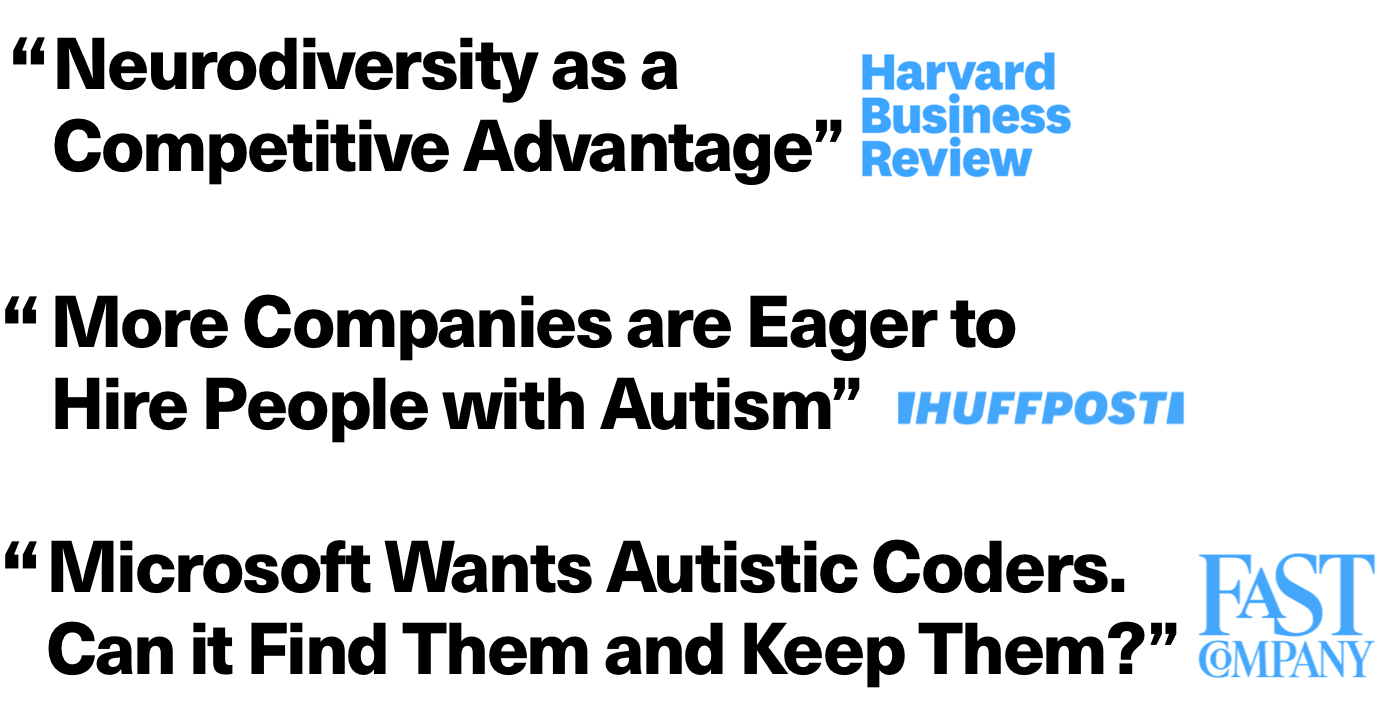
- Harvard Business Review: Neurodiversity is a Competitive Advantage
- Forbes: Where is Autism Employment Heading in 2017?
- Huffington Post: Why More Companies are Eager to Hire People with Autism
- Fast Company: Microsoft Wants Autistic Coders. Can it Find Them and Keep Them?
- Inc: 50,000 People with Autism Needs Jobs This Year. Here's Why You Should Hire Them

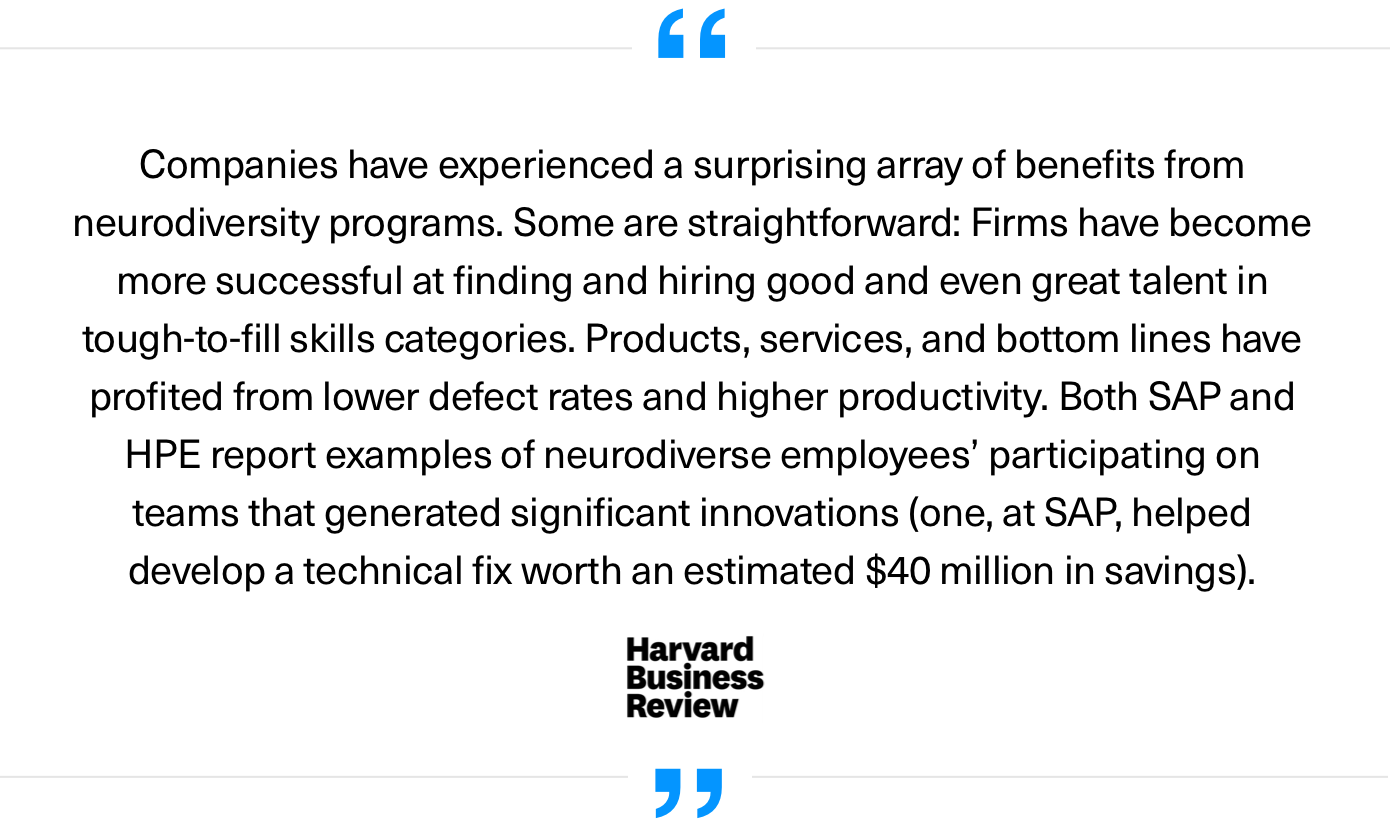
Market
There is a lack of skilled technical talent to fill the 1.4+million open tech roles by 2020. More Autistics (34%) go into STEM related majors than neurotypicals (22%) and excel with less error rates. This is an un/undertapped talent pool and it is just in time.
With the $60k+ average annual salary for entry-level, full-time tech industry professionals and the anticipated 1.4M vacant tech job openings in the next 5 years, tech is an attractive industry for autistics to pursue careers in.
Over the last decade, companies such as Microsoft and SAP have implemented autism hiring initiatives. This was done not to combat autistic unemployment, but because they have seen that autistic adults can be exceptional employees and drive innovation when provided the right structure, mentorship, and on-boarding.
Additionally:
Starting 2018, EEOC requires federal contractors to increase hires of people with disabilities from 7% to 12%.
American Apprenticeship Initiative – Dept. of Labor subsidized costs for training and provides $7,5K to employer towards mentorship.
Regional centers subsidize vocational training.
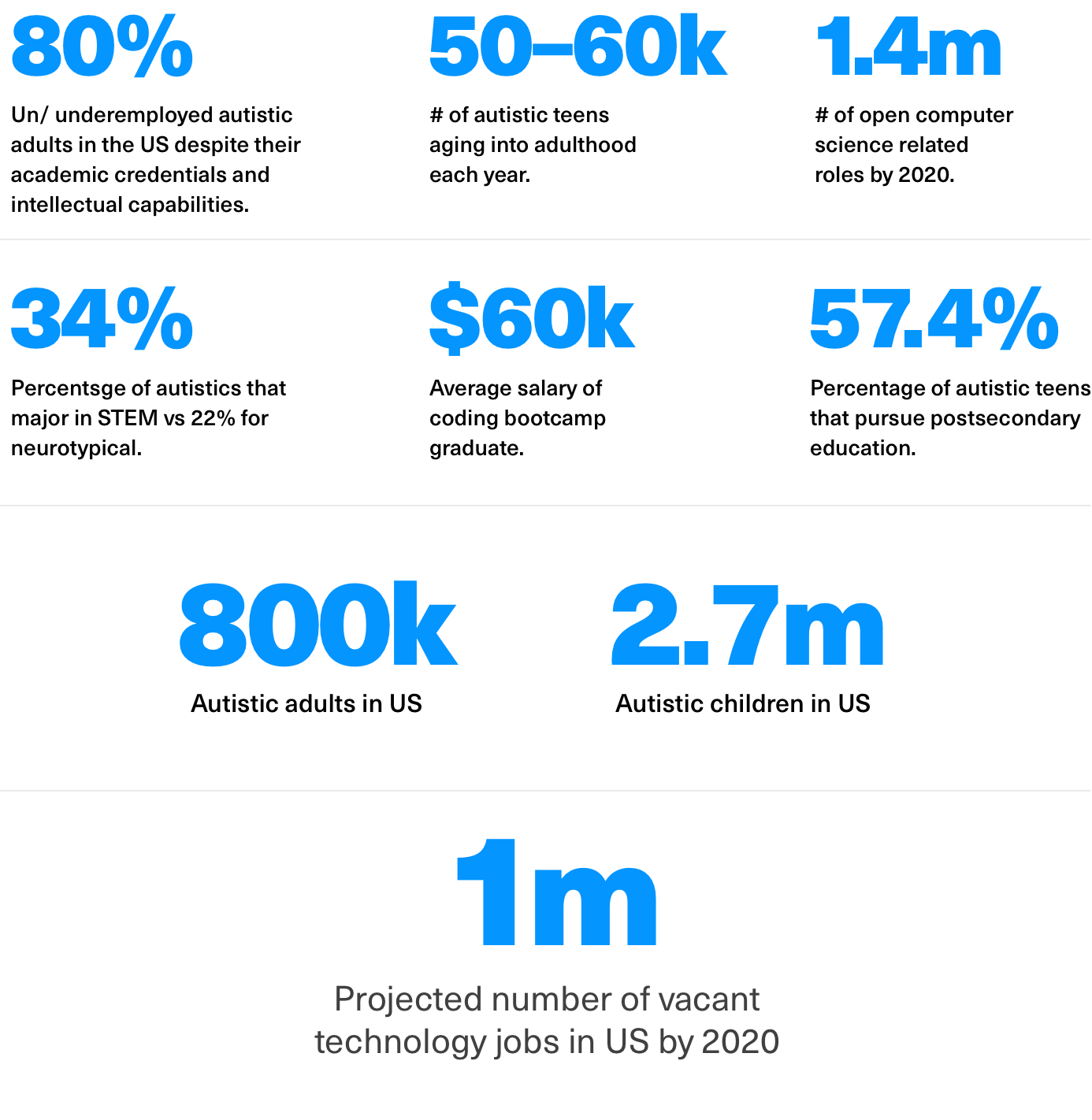
What Your Investment Goes Towards
We are looking for financing to reach 1,200 ASD youths and adults through our STEM and Social Skills program online and in person by end of 2019.
Our vision and goal is for a state of the art non-traditional learning classroom for our Computer and Robotics Lab. Our students need room to move to learn and innovate. We will have moveable desks and chairs, NAO codeable and teaching robots, laptops with up to date software, and experienced technical and neurodiverse staff. The classroom will have an open learning environment that is conducive to experimenting, innovating, and hackathons. There will be enough room for students to have their support and accommodations such as service and therapy dogs.
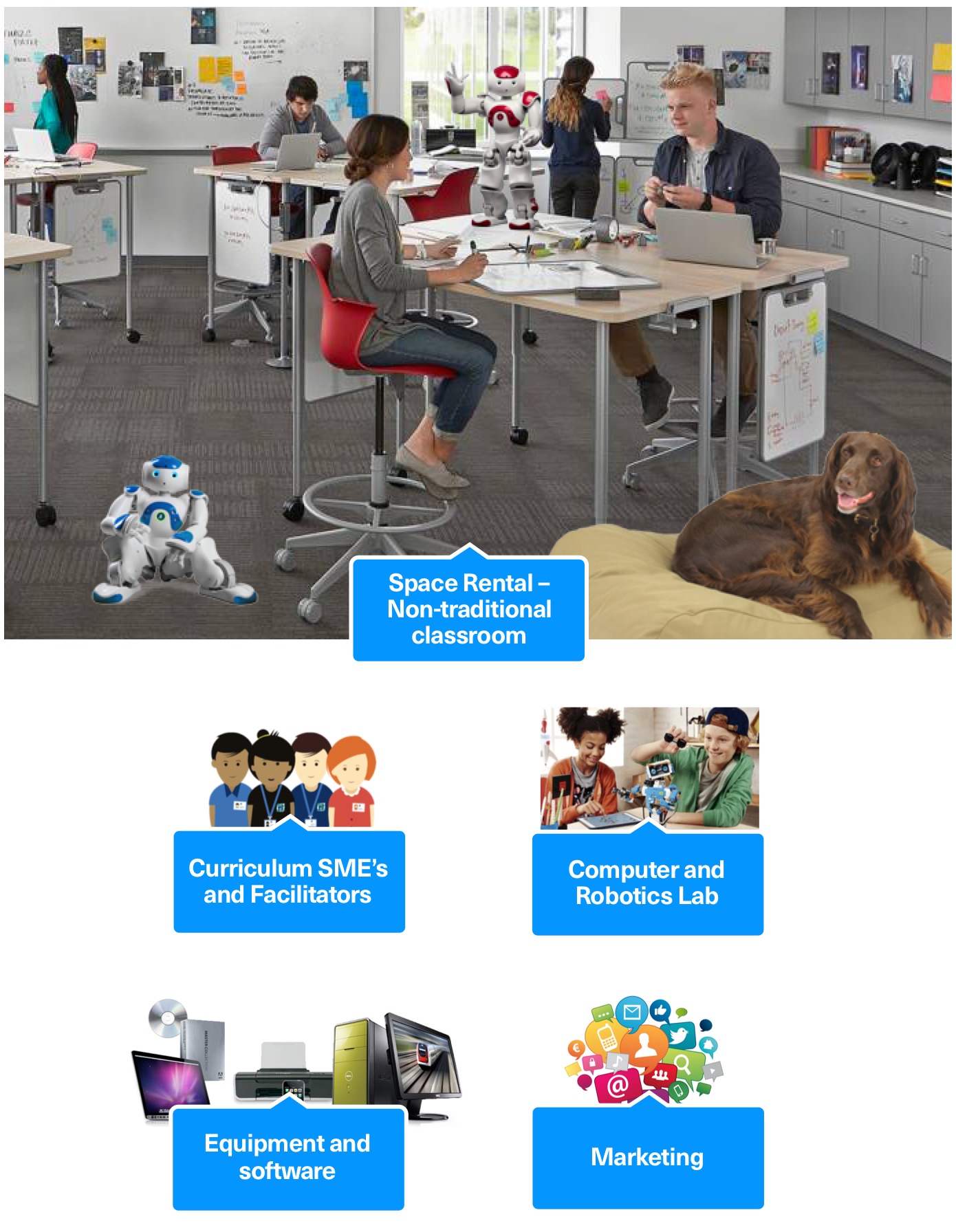
Our team
We are a team of autistic and neurodiverse individuals seeking to challenge stigma by helping people with disabilities achieve skills that lead to independence, meaningful work, meaningful relationships and to be of value to their community.

Message from the CEO
I was diagnosed with autism when I was 2 years old, shortly after my older brother Trinity was diagnosed. When Trinity was barely a toddler, experts told my parents he would never be able to speak or live an independent life. They were all wrong.
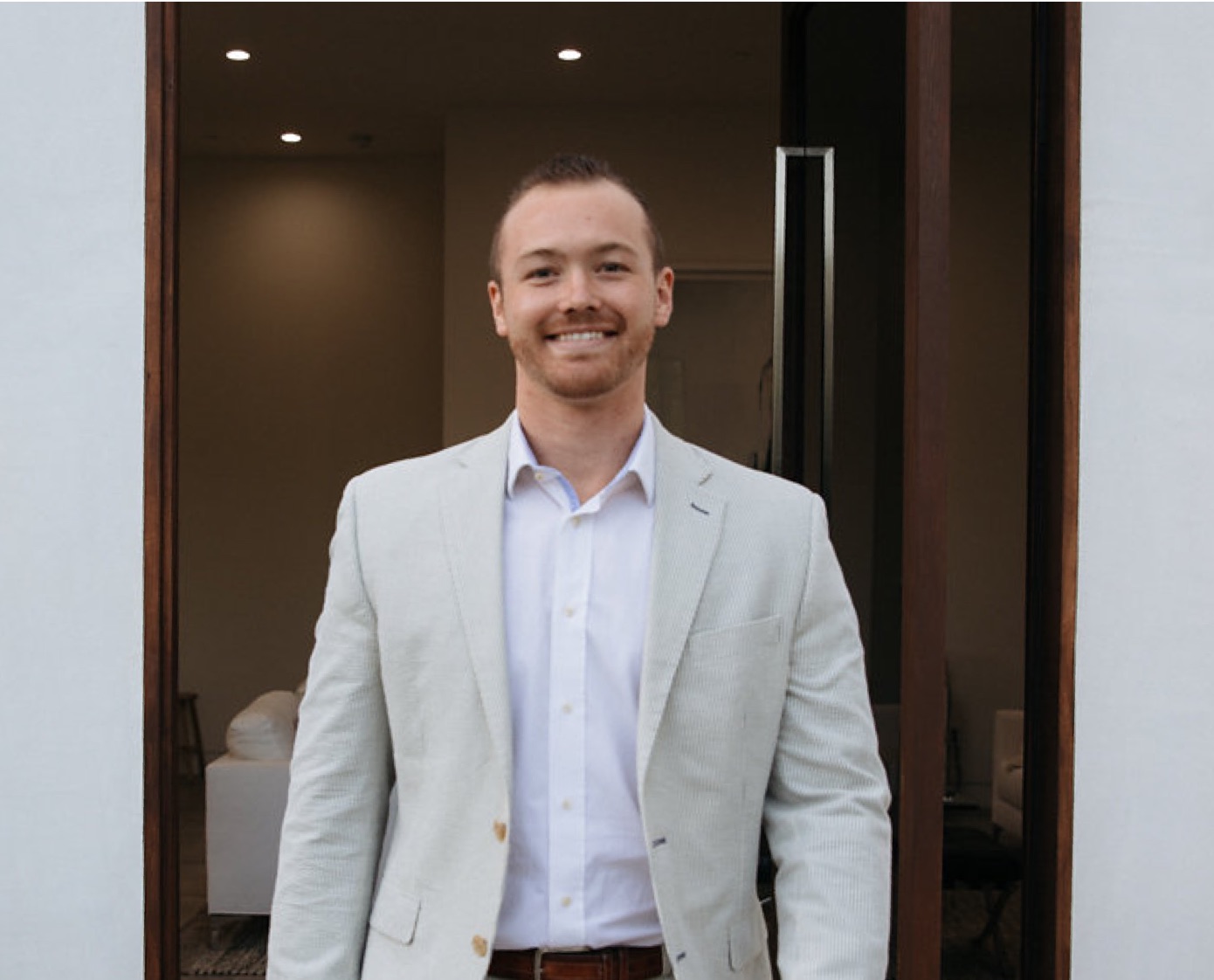
At age 7, Trinity finally spoke his first words and continued to defy his diagnosis. The experts were wrong. Today, Trinity is studying architecture and attending college. He is also a licensed real estate agent.
Trinity and I are extremely lucky, we had the support and resources needed to excel and pursue our dreams. When I was in college studying business administration, I realized how fortunate I really was. It was in college where I recognized that the numbers of my autistic peers had drastically declined since high school. This truly distressed me.
That’s when I decided that I wanted to build something that would help other autistics. Everyone deserves the right to work and be self-sufficient. While researching autism, I saw an alarming statistic repeated over and over again. “...over 80% of autistic adults are either unemployed, or underemployed.” How can that be? It’s just not acceptable.
From experience I have seen highly intelligent autistics not getting the opportunities they deserve due to communication barriers. I know firsthand that with the right support and opportunity, people with cognitive differences can accomplish great things. That is why I founded Coding Autism, a new kind of professional education that would provide autistics with employable skills that would not only provide them with jobs, but fulfilling careers where they can fully utilize their talents. In addition, we are redefining what talent looks like and that autistics are truly untapped talent.

Invest now and help Coding Autism accomplish its goal of navigating autistics to meaningful careers.
Gratefully,
Oliver Thornton
CEO & Founder of Coding Autism
Deal terms
$2,600,000
The maximum valuation at which your investment converts
into equity shares or cash.
Learn more
0%
If a trigger event for Coding Autism occurs, the discount provision
gives investors equity shares (or equal value in cash) at a reduced price.
Learn more.
$107K
Coding Autism must achieve its minimum goal of $25K before the deadline. The maximum amount the offering can raise is $107K.
Learn more
Learn more
Crowd SAFE
A SAFE allows an investor to make a cash investment in a company, with rights to receive certain company stock at a later date, in connection with a specific event.
·
Learn more
Documents
 Form C
SEC.gov
Form C
SEC.gov
Bonus perks
- Thank you note and social media shout out from the founders of Coding Autism.
- Limited Edition Coding Autism Notebook and Sticker
- Limited Edition Coding Autism Mug
- Have your company name branded on our website and Coding Autism Swag bag
- Sponsor a teen for a 3 month robotics bootcamp
-
Sponsor 2 students for our 3 month robotics bootcamp along with being listed as a sponsor on our Robotics Lab Plaque
Limited (11 left of 12)
- Receive a signed composite of the participants of our inaugural in-person coding bootcamp and listed as official sponsor on our Coding Autism site and Limited Edition T-Shirt.
- All of the above plus meet the founders in person in San Francisco for a lunch or dinner
-
($500 reimbursed towards travel expenses)
Limited (5 left of 5)
-
All of the above plus become our Robotics Class sponsor listed on our site and ability to name the robot you helped purchase.
Limited (5 left of 5)
- Become our Robotics Class sponsor listed on our site and ability to name 2 robots you helped purchase. In addition, a thank you lunch or dinner with founders for 4 is included.
-
Become our main Robotics and Computer Lab Sponsor with official ribbon cutting ceremony. Name the lab and 2 robots that your generous donation helped purchased. In addition, a thank you dinner with founders for 4 is included.
Limited (1 left of 1)
Why others invested
See all reviews (0) See all (0)I have a nephew with Asperger's Syndrome and I believe that this company will be able to open new avenues of success for him. I will be praying for your success!!

Happy to highly skilled, least appredciated people being helped. As my twelve year old is trying to help Autism kids by creating his own innovative idea thru his school, I wish to my part.
I am fully supportive of the idea, it has an important social impact and I am sure it will be a success.
About Coding Autism
Coding Autism Team
Everyone helping build Coding Autism, not limited to employees
Press
FAQ
Do you have your Meet the Drapers recap transcript?
Oliver Thornton: Hello judges. My name is Oliver Thornton.
Austen Weinhart: I'm Austen Weinhart, and we are Coding/Autism. Coding/Autism trains and navigates adults on the autism spectrum into tech jobs.
Jesse Draper: Coding/Autism.
Bill Draper: Marvelous. I love what they're doing, I love their commitment, I like how they got there.
Jesse Draper: Yeah.
Bill Draper: They're going to succeed.
Jesse Draper: Completely agree. I think they're really on to something. I've never seen anything like it, and they're making significant change, and we do know there are, as they said, millions of people with autism in the U.S. alone.
Bill Draper: Can't you believe that an autistic person might be better at coding in some ways than a normal ...
Jesse Draper: Oh, 100 percent.
Tim Draper: I was concerned about market size, and I'm also concerned about B Corp. B Corp is sort of the worst of both worlds. I think since the market size is not that big, you may be right that a nonprofit here is the answer.
Jesse Draper: I think a nonprofit is the way.
Tim Draper: I like the spirit of the idea that, "Yeah, we're going to make money," so this is a growth industry.
Jesse Draper: Anyway, before we go any further, thumbs up, thumbs down, thumbs all around.
Bill Draper: Thumbs up.
Jesse Draper: I think thumbs up.
Tim Draper: Thumbs almost up.
Bill Draper: Great.
Do you have your Meet the Drapers appearance transcript?
Oliver Thornton: Hello judges. My name is Oliver Thornton.
Austen Weinhart: And I'm Austen Weinhart, and we are Coding Autism. Coding Autism trains and navigates adults on the autism spectrum in the tech jobs.
Today we've come to talk about three key points. We're going to talk about trends in autism hiring, the problem, and our solution to the problem.
Oliver Thornton: Did you know that one out of 68 children in the United States today are born with autism each year? Did you know that 40,000 to 60,000 individuals on the autism spectrum age into adulthood each year? Lastly, did you know that around 80% of all adults on the autism spectrum are either unemployed or underemployed?
As an adult on the autism spectrum myself, I find this statistic to be completely unacceptable. For this reason, we decided to found the company Coding Autism.
Austen Weinhart: Our solution to the problem is the first ever coding bootcamp, specifically tailored to the needs of people on the autism spectrum. Our program is full-stack JavaScript, but what differentiates us from our competition is our focus on socialization and career counseling.
A lot of the times, the biggest barrier to autism hiring is not actually their technical capability. A lot of the times people in the autism spectrum excel at technical roles, but their communication skills. So by focusing on socialization, we're not only ensuring that our candidates are more likely to get hired, but also to stay hired.
Oliver Thornton: In the technology industry today, there's been an increased trend in autism hiring. In fact, companies like Microsoft, SAP, and Hewlett-Packard have all increased their autism hiring initiatives and developed autism hiring programs that have been so successful, that they've ramped up the recruiting for talent on the autism spectrum tenfold.
The reason behind this is because adults on the autism spectrum can be exceptional employees and drive innovation within companies, when provided the right structure, onboarding processes, and mentorship.
Austen Weinhart: So today we've talked about three key points. We've talked about trends in autism hiring, the problem, and our solution to the problem.
To this end, we've raised a little over $100,000, and today we've come here to ask for $200,000 which will go to the design and staffing of our first program.
Oliver Thornton: Again, we're Coding Autism, and we thank you guys so much for your time, and we're here to answer any questions you may have.
Austen Weinhart: Thank you.
Bill Draper: Why aren't you a non-profit as opposed to a for-profit?
Jesse Draper: Exactly what I was thinking.
Oliver Thornton: Sure. We decided to develop our business model as a for-profit social enterprise. We actually, at this point in time, have the pending B Corp certification through B Labs. In a year from now we're going to reanalyze our company to get the fully certified B Corp status.
The reason why we wanted to go the for-profit route instead of the non-profit round, is because we firmly believe through research, as well as through consumer validation, that with the for-profit model it would be easier for us to scale. We'd be able to acquire top end talent. We won't have to operate in the bureaucratic non-profit process where we're consistently fundraising, and relying on charitable and individual donations and contributions to be sustainable.
And that, it allows us to grow the organization in a way that allows us to have that hybrid business model, as well as position ourselves for success, both on the financial side, as well as the social impact side.
Bill Draper: That's a very good answer and I totally agree with everything you said. If you do decide to go to the non-profit route, Draper Richards Kaplan is something that specializes in non-profit organizations at the earliest stage. And we give $300,000 over a three year period with a lot of coaching, and we're only with you for three years.
I think you might remember that in case you do go non-profit.
Oliver Thornton: Well, to add on to our current business model, we actually are in the process of developing a non-profit arm, which we're going to brand Coding Autism Foundation.
The purpose of that non-profit arm would help subsidize the tuition cost of our for-profit program, as well as provide a funding in the form of scholarships to low income families, for other vocational training programs that someone may want to enroll into.
Tim Draper: You know, this B Corp thing, it thought wow, this is the best of both worlds, but then when you dig down and you look into it, it turns out it's the worst of both worlds.
You are regulated as a for-profit, and you don't get any of the benefits of being a non-profit. So why go B Corp? I mean, I yet to have anyone being able to tell me why there's any kind of reason to go there.
Oliver Thornton: From my understanding, with the B Corp status, there is the B Corporation as a business structure, there's also the certified, or pending B Corp status that's sponsored through B Lab, where your business model isn't necessarily a B Corporation. You're still an LLC, but you have the B Corp label as if you operate under a social impact practice, and that everything you operate is on the best standards ethically as a social enterprise. So it allows us to stabilize ourselves still as the LLC, instead of having the formal B Corp model.
Jesse Draper: Interesting.
Tim Draper: It's just, I'm worried that you become under the government microscope, instead of just being able to run your business. So keep that in mind as you go through and figure out what you're going to be.
Jesse Draper: I know you, right?
Oliver Thornton: Yes.
Jesse Draper: You taught me tennis.
Oliver Thornton: Yeah, I did.
Jesse Draper: Right? He's a really good tennis player. We're all big tennis players. We love playing tennis. But I was testing out your friend's app, right? And I signed up for-
Oliver Thornton: Two.
Jesse Draper: ... Two.
Oliver Thornton: Yeah.
Jesse Draper: Amazing. That's so funny. Good to see you again. I think you told me a little about this before, and I love that you guys came in and pitched today. I was-
Tim Draper: What's the strongest part of your game?
Oliver Thornton: My serve, definitely. I've always been a big server. It's gotten me out of a lot of trouble in competitive matches, and it allowed me to play college tennis momentarily in division one, as well as in division three.
Tim Draper: Terrific.
Jesse Draper: Amazing.
Bill Draper: What got you interested in autism? Do either of you have any problem that way, or?
Oliver Thornton: I was personally diagnosed with Asperger syndrome when I was two years old, shortly after my older brother was diagnosed with autism. Later on in my life, I have another sibling, brother, who is 10 years old today, and was diagnosed with Asperger. So three of the five siblings in my family tree are on the autism spectrum to a certain degree.
And growing up, I've always wanted to build a business that improved the opportunities for individuals on the autism spectrum. And when I was in my last semester of college at California Lutheran University, I was in this class called Venture Development, and the premise of the class was to develop a start-up concept that you would enroll into your university's venture competition.
So I took that as a goal and opportunity to explore autism in further detail. And when I learned about the autism unemployment and underemployment rates that exist in our society, alongside the major recruiting trends from tech companies, because they were able to identify the talents that many adults with autism contain, that I thought it was a no-brainer to develop a business model that would supplement autistic individuals, and provide that autism specialized service, and focus, so that they can reach their highest potential.
Tim Draper: So Microsoft-
Bill Draper: What about you?
Austen Weinhart: And then, for me, I've known Oliver and his family since birth. I mean, I consider him family. He's like a brother to me. I've seen how much progress both he and his brother have made through life and all the amazing strives that they have achieved. And just growing up with that, and also I have some family members of my own that are on the spectrum ... autism is a cause that's very near and dear to my heart.
Bill Draper: I see.
Austen Weinhart: When Oliver told me about his idea, I had just gone through ... I had recently gone through a bootcamp similar to the one he wanted to create, and I've been working as a web developer for a couple of years and turned my life around that way, it just seemed like a no-brainer that we should work together and just really make this dream a reality.
Bill Draper: How long have you been working? When did you start this?
Oliver Thornton: We started this business in April of 2016. It's about 15 months old. The first year, a lot of the time was invested into consumer validation, and really testing the market with how we wanted to build out the business model.
We explored both on the business to consumer side, as well as the business to business side. We went to several companies that ... we wanted to figure out exactly what type of technical skills they were looking for. We learned that there was a wide aray of different skillsets they were hiring for, from web development to software testing, to even cyber security.
And then we went on the consumer side from individuals on the spectrum not wanting to go through a four year college because of the broad general ED courses and not being able to take courses that were specialized to what their true passions are.
Creating something that is a little bit more tight-knit and focused on something that they may be incredibly passionate about, seemed like it was just something that a huge need in the autistic community demanded.
Tim Draper: How do you make money? How does the business make money?
Austen Weinhart: We operate on a tuition based model.
Jesse Draper: So it's like a school.
Tim Draper: It's a school?
Austen Weinhart: It's a vocational training program. We're not claiming to be an academic institution of any kind, but we're here to teach-
Tim Draper: And then do you also make money from the corporations that hire them?
Austen Weinhart: Absolutely.
Tim Draper: So you get it on both sides. You get tuition, and then you get some money-
Austen Weinhart: Right. And then for job placement we have-
Bill Draper: How far along are you?
Austen Weinhart: We're till pretty ... I mean, we're launching our very first program in January is our target date to launch our first program.
Bill Draper: What about students? How many?
Austen Weinhart: We have a wait list right now of over 100 people who have applied, but our first program is going to be a small group of 15, because we really want to keep our classroom small.
Bill Draper: So you haven't gotten them working yet.
Tim Draper: You haven't started one yet.
Oliver Thornton: Yeah. The first year we invested a significant amount of our time into the validation of it. Once we captured all of that data, we developed a crowdfunding campaign, a rewards-based crowdfunding campaign on Start Something Good. That's a social enterprise based crowdfunding platform.
Jesse Draper: And how did that go?
Oliver Thornton: We raised $52,855 from 250 different supporters in 30 days.
Jesse Draper: Great.
Tim Draper: And that money was for equity? For ...
Oliver Thornton: That was zero equity whatsoever. A rewards-based campaign's a little bit different than your equity-
Tim Draper: Like a donation?
Oliver Thornton: It's considered a contribution and what you give back in exchange is rewards. For example, if someone contributed $45, we gave them one of these awesome Coding Autism shirts. If someone contributed $100, they were able to permanently brand their name on a portion of our website. And you were able to set up tiers from as little as $10 all the way up to $7,500. And depending on the amount of money that you raised in different price points, that's where the total ...
Bill Draper: How many individuals did you end up have as your shareholders?
Oliver Thornton: Through the rewards campaign there was zero equity ties whatsoever.
Bill Draper: I see. Yes.
Jesse Draper: So that was just [crosstalk 00:50:07]-
Oliver Thornton: The remaining fund, because we said we've raised around $100,000, we raised at a $2,5 million evaluation. We've only given up just about 2% of equity in our company so far.
Jesse Draper: I still think this should be maybe set up as a non-profit. I think that that is ... I think you're onto something, because it's a school. It's an education system, and then you can fund yourself. But I like the social enterprise idea, so it could be kind of like in the Toms Shoes realm, where you're doing good, but you're also making money, so you don't have to throw fundraisers all the time. And you'd make that money from when you place people.
But I feel like it should still be a non-profit. I don't know if this is ...
Tim Draper: Well not if you can make money as a corporate-
Bill Draper: I think he had a good answer to that.
Tim Draper: Yeah.
Jesse Draper: Yeah.
Tim Draper: Here is my question. You hinted that Microsoft had this program, and they decided to beef it up, meaning they're finding that the autistic people that they are hiring are maybe over-performing than people who don't have autism in certain roles. So that's what I wanted to get to.
Is there real extra value to an autistic performer? Maybe on average they're not performing, but a few of them are over-performing, and Microsoft is feeling like that's something I really want to focus on.
Bill Draper: Like, are they better coders than the average?
Austen Weinhart: The great thing about a lot of people on the spectrum is they tend to be systems thinkers. They are people that like structure, repetition. They're very meticulous with detail, which tends to lend itself very well to technical roles.
The companies that have autism hiring initiatives are already seeing that they excel as software testers, and quality assurance professionals. They do very well in cyber security, and also as engineers and web developers.
We see that there's this talented pool of people that are underutilized. And we don't see it as a charity to get these people employed, because they're very talented. We just need to find the right avenue to show the world what they-
Tim Draper: And you're going to be selecting the people that you bring in to the school. You're not going to take everybody, right?
Austen Weinhart: Right. And at this point in time we can't take everybody. Our first program is primarily focused around solving the autism unemployment issue. So we're going to take ... our first group of candidates are going to be the group that we feel very confident that we can place into roles-
Bill Draper: Maybe 30 people?
Jesse Draper: He said 15.
Bill Draper: 15?
Jesse Draper: Where do you find the place, where do you find [crosstalk 00:52:44]?
Oliver Thornton: Our first program that we're launching is going to be in Westlake, which is next to Thousand Oaks. It's part of the Southern California Los Angeles region. A lot of the talent that has applied through our program have reached out to us through several modes of communication when we did have the crowdfunding campaign. We were featured in articles such as Mashable, Autism Speaks, Yahoo and Software Development Times, where that reached out to several individuals in that demographic.
I tend to write a lot of different articles that are related to the autism community. That has also brought in several interested prospects. Through our efforts, whether it's through pitching in start-up competitions, or expo events in the Los Angeles area, we've also been able to reach out to certain people.
And the autism community is very small. When they hear about a business that has the capabilities of what Coding Autism is projected to develop, the word of mouth just spreads like wildfire.
Tim Draper: How big could this get? How big is the market? How many autistic people that might fit into your category, and then, if you place them all, how big a market could that be?
Oliver Thornton: Sure. The coding academy market as a whole, the market cap is around $200 million. The autism community, there's ... in 2014 by the CDC, they stated that there's roughly 3.5 million autistic Americans, 2.7 million being children ages zero through 17, and 800,000 being adults 18 plus.
A lot of the individuals who have been diagnosed are individuals that were formerly diagnosed with a licensed professional to do so. There's a significant population that's either misdiagnosed, or undiagnosed as well, so with companies like this that are advertising this autism specialized mission and coding instruction, and this opportunity to transform your life, it also motivates individuals to want to see if they are on the autism spectrum as well.
Jesse Draper: I think this is really cool.
Tim Draper: Yeah. So do you have a sense for the market size? How big could this be?
Oliver Thornton: Sure. From-
Tim Draper: If you've got all the autistic people that-
Jesse Draper: Or even a smaller side.
Tim Draper: ... are qualified, that you would bring in, that you would then place. How big would that be?
Jesse Draper: And how much money would that ...
Oliver Thornton: Sure. What we've stated in a lot of our marketing materials, is that we want to try to train and employ at least 1,500 adults on the autism spectrum by 2020. With the tuition price of our program, if we were to train 1,500 adults on the autism spectrum through our program at a $20,000 price, that would be a $30 million revenue before expenses. That's just the physical offerings.
In the future we do see ourselves developing an online platform as well, getting involved in the children and teenager market and other offerings as well, that would generate additional revenue.
Bill Draper: Will they pay that kind of tuition, do you think? Have you tested the market?
Austen Weinhart: We have seen through just the general coding bootcamp market, which is flourishing right now, that this is the go in rate that most of these programs are charging.
Tim Draper: Is that right?
Austen Weinhart: And the reality is that for a program like ours to be successful, we need to hire very specialized talent, from the coding instructor that has to not only the experience in the field, but also be able to teach-
Tim Draper: That can work with autistics.
Austen Weinhart: Right. And be able to work with people on the spectrum, as well as having coaches for both social skills, as well as career coaches.
This is the reality of the situation, is that in order to put a program like this together, we have very highly specialized talent that requires good compensation in order to ... they have to compensate them competitively.
Oliver Thornton: And also to elaborate more on to that, although the price tag may be steep and some people developed a notion that, okay, is this program geared for the fluent autism community? Our answer would be no, because we're providing several incentives to slash that cost, whether it's through financing options. A lot of different coding academies and bootcamps have financing options that they build with companies like Climb Credit and Skills.fund.
We also, through our non-profit arm, like we mentioned earlier, want to subsidize that cost through scholarships for lower income families. A lot of individuals on the autism spectrum are also partnered with regional centers, the department of rehab, and there's other local funding incentives to help individuals with disabilities and autism in particular, acquire training so that they can enter the workforce.
Because at the end of the day they want to slash that 80% unemployment and underemployment rate. They want to be able to create excellent opportunities for that population, for them to thrive and have promising and lucrative careers.
Jesse Draper: That's great.
Bill Draper: You don't guarantee them a job.
Austen Weinhart: No. We can't promise them that, but we're providing a way to prepare them, so that they have the qualifications needed to get an entry level developer job.
Bill Draper: Right. Good.
Jesse Draper: Great.
Bill Draper: I think it's terrific.
Jesse Draper: Yeah. Me too.
Tim Draper: Great. It's great what you're doing.
Bill Draper: Thank you very much.
Austen Weinhart: Thank you.
Oliver Thornton: We really appreciate it.
Tim Draper: Thanks. Let's hope you can get some either up votes, or some funding ...
Jesse Draper: Funding.
Tim Draper: ... from some of our TV audience.
Jesse Draper: So do you want to fund Coding Autism? Or do you want to vote? If you can't fund them, you can still vote and support this incredible business. Vote and fund.
Bill Draper: Good luck to you guys.
Austen Weinhart: Thank you so much.
Bill Draper: Thank you very much.
Oliver Thornton: Thank you so much.
Tim Draper: Thanks for coming in.
Oliver Thornton: We really appreciate it.
Jesse Draper: That was great.
So, we have an incredible guest mentor, who has been behind the scenes, helping these entrepreneurs pitch, teaching them all of his business tips and tricks, and he has quite a few. He sold his first company Involver, to Oracle. He's currently co-founder of SV Academy, and he was on Inc's 30 Under 30. So this guy is pretty incredible. Let's see what Rahim Fazal is up to behind the scenes.
So Coding Autism.
Bill Draper: Marvelous. I love what they're doing, I love their commitment, I like how they got there.
Jesse Draper: They're making real change.
Bill Draper: They're both good friends. They're going to succeed. And a lot of people are going to help them do it, whether through a non-profit or a for-profit, it doesn't really matter. It's a very fine thing they're trying to do.
Jesse Draper: I completely agree. I think they're really onto something. I've never seen anything like it, and they're making significant change. And we do know there are, as they said, millions of people with autism in the US alone. So there's deffinitely a need for something like this.
Bill Draper: And don't you think ... can't you believe that an autistic person might be better at coding in some ways than a normal-
Jesse Draper: 100%.
Tim Draper: Yeah. Doing, they said, repetitive tasks. I thought they were both just terrific.
Bill Draper: I did too.
Tim Draper: These two really are going to make something happen. I was concerned about market size, and I'm also concerned about B Corp. B Corp is sort of the worst of both worlds.
Bill Draper: Yeah. They may change their mind on that.
Tim Draper: And I think since the market size is not that big, you may be right, that a non-profit here is the answer.
Jesse Draper: I think the non-profit is the way-
Tim Draper: But I like the spirit of the idea that, hey, we're going to make money. We don't want donations. We don't want sympathy. We want to really run this business.
Jesse Draper: Yeah. So it's a social enterprise. I mean, I think it would be great for DRK Foundation.
Bill Draper: Yeah, I do too. Draper Richards Kaplan.
Tim Draper: Can you guys invest in a B Corp?
Bill Draper: Yeah.
Tim Draper: Well, then maybe it is its solution.
Bill Draper: We can.
Jesse Draper: Yeah. I think that-
Tim Draper: I was wondering, if you're a B Corp, can you take donations and take equity?
Bill Draper: No. We don't take any ...
Jesse Draper: Equity.
Tim Draper: No. But can a B Corp take donations on one end, and equity on the other?
Bill Draper: I think so, yes.
Tim Draper: If they can, then there is a reason to have one. But I'm not so sure.
Jesse Draper: [crosstalk 01:00:55].
Bill Draper: Regardless of how they do it and who they do it with, I think there is something there that I think is really very important, and that is this idea that autistic people might have more value than the average ... in certain areas, and coding might be one of them.
Jesse Draper: I think that's so true. I think it's incredible.
Tim Draper: Autism is growing at a very fast rate-
Bill Draper: I know.
Tim Draper: ... and it has to do with older fathers. That's one of the reasons-
Bill Draper: Is that right, son?
Tim Draper: Yeah. There are more older fathers and there's been some relationship ...
Jesse Draper: Inappropriate autism [crosstalk 01:01:32].
Tim Draper: ... between those two. But it's been growing. So this is a growth industry.
Jesse Draper: Anyway. Before we go any further, thumbs up, thumbs down, thumbs all around.
Bill Draper: Thumbs up.
Jesse Draper: I think thumbs up.
Tim Draper: Thumbs almost up.
Bill Draper: Great.
Is Coding Autism a non-profit?
We are a for-profit LLC. As a for-profit business we will be able launch and scale more quickly by not having to rely on constant fundraising. This will allow us to make more reliable financial projections, and be able to compensate the best talent we can find.
Where is Coding Autism located?
We are located in the San Francisco Bay Area.
Do you have classes for children?
We currently have online coding and social skills pilots for children ages 13 and older. We plan on launching in person workshops by the end of Q1 2018.
When will Coding Autism be launching their 20 week vocational program?
Our goal is to launch our first class in Q2 2018.
How do people sign up for the wait-list for Coding Autism's first in-person coding bootcamp?
If you or someone you know would be interested in taking the class, it isn’t too early to reach out! Please visit our website to add yourself to our waitlist and we will follow up with you as we get closer to launch.
How do students apply? Are the students vetted?
Students will apply by filling out an application on our website. We will review the applications and reach out to students that we think would be a good fit. From there we will conduct interviews, either in person or through video conferencing. With our web development immersive, we will be vetting students based on our assessment that they can keep up with the rigorous coursework and be employable with the proper training. Autism is a spectrum, and some students will have an easier time acclimating to neurotypical workspaces than others. This does not mean that we have forgotten nonverbal or other students with greater barriers. As we expand we will be providing other programs that will allow these types of learners an opportunity to acquire new skills, socialize, and demonstrate their talents. For the program we are fundraising for now, we are limiting our scope to the students that we think we can best equip to find employment after graduation.
Will students get a degree? Are you accredited?
Upon completion of the course, students will receive a certificate of completion. As with other coding bootcamps, we are not accredited. What students show their employers is the quality of their portfolio, the work that they produce while at Coding Autism. We are not an academic institution, but a company focused around training students with real-world vocational skills.
Discussion
This site (the "Site") is owned and maintained by OpenDeal Inc., which is not a registered broker-dealer. OpenDeal Inc. does not give investment advice, endorsement, analysis or recommendations with respect to any securities. All securities listed here are being offered by, and all information included on this Site is the responsibility of, the applicable issuer of such securities. The intermediary facilitating the offering will be identified in such offering’s documentation.
All funding-portal activities are conducted by OpenDeal Portal LLC doing business as Republic, a funding portal which is registered with the US Securities and Exchange Commission (SEC) as a funding portal (Portal) and is a member of the Financial Industry Regulatory Authority (FINRA). OpenDeal Portal LLC is located at 149 E 23rd St #1314, New York, NY 10010, please check out background on FINRA’s Funding Portal page.
All broker-dealer related securities activity is conducted by OpenDeal Broker LLC, an affiliate of OpenDeal Inc. and OpenDeal Portal LLC, and a registered broker-dealer, and member of FINRA | SiPC, located at 1345 Avenue of the Americas, 15th Floor, New York, NY 10105, please check our background on FINRA’s BrokerCheck.
Certain pages discussing the mechanics and providing educational materials regarding regulation crowdfunding offerings may refer to OpenDeal Broker LLC and OpenDeal Portal LLC collectively as “Republic”, solely for explanatory purposes.
Neither OpenDeal Inc., OpenDeal Portal LLC nor OpenDeal Broker LLC make investment recommendations and no communication, through this Site or in any other medium should be construed as a recommendation for any security offered on or off this investment platform. Investment opportunities posted on this Site are private placements of securities that are not publicly traded, involve a high degree of risk, may lose value, are subject to holding period requirements and are intended for investors who do not need a liquid investment. Past performance is not indicative of future results. Investors must be able to afford the loss of their entire investment. Only qualified investors, which may be restricted to only Accredited Investors or non-U.S. persons, may invest in offerings hosted by OpenDeal Broker.
Neither OpenDeal Inc., OpenDeal Portal LLC nor OpenDeal Broker LLC, nor any of their officers, directors, agents and employees makes any warranty, express or implied, of any kind whatsoever related to the adequacy, accuracy or completeness of any information on this Site or the use of information on this site. Offers to sell securities can only be made through official offering documents that contain important information about the investment and the issuers, including risks. Investors should carefully read the offering documents. Investors should conduct their own due diligence and are encouraged to consult with their tax, legal and financial advisors.
By accessing the Site and any pages thereof, you agree to be bound by the Terms of Use and Privacy Policy. Please also see OpenDeal Broker’s Business Continuity Plan and Additional Risk Disclosures. All issuers offering securities under regulation crowdfunding as hosted by OpenDeal Portal LLC are listed on the All Companies Page. The inclusion or exclusion of an issuer on the Platform Page and/or Republic’s Homepage, which includes offerings conducted under regulation crowdfunding as well as other exemptions from registration, is not based upon any endorsement or recommendation by OpenDeal Inc, OpenDeal Portal LLC, or OpenDeal Broker LLC, nor any of their affiliates, officers, directors, agents, and employees. Rather, issuers of securities may, in their sole discretion, opt-out of being listed on the Platform Page and Homepage.
Investors should verify any issuer information they consider important before making an investment.
Investments in private companies are particularly risky and may result in total loss of invested capital. Past performance of a security or a company does not guarantee future results or returns. Only investors who understand the risks of early stage investment and who meet the Republic's investment criteria may invest.
Neither OpenDeal Inc., OpenDeal Portal LLC nor OpenDeal Broker LLC verify information provided by companies on this Site and makes no assurance as to the completeness or accuracy of any such information. Additional information about companies fundraising on the Site can be found by searching the EDGAR database, or the offering documentation located on the Site when the offering does not require an EDGAR filing.
To help the government fight the funding of terrorism and money laundering activities, Federal law requires all financial institutions to obtain, verify, and record information that identifies each person who opens an account. Therefore, when you use the Services we will ask for your name, address, date of birth, and other information that will allow us to identify you. We may also ask to see your driver's license, passport or other identifying documents.
Republic and its affiliates are not and do not operate or act as a bank. Certain banking services are provided by BankProv, member FDIC / member DIF. Digital (crypto) assets and investment products are not insured by the FDIC, may lose value, and are not deposits or other obligations of BankProv and are not guaranteed by BankProv. Terms and conditions apply.

Made in SF/NYC










